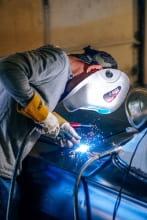By: Keaton Fletcher
Will your job be replaced by a robot? A report by McKinsey Global Institute suggests probably not.
Most people in the workforce today have, like those before them, wondered whether they will be replaced by new technology. The concern is so great, that Time Magazine released an article and an associated widget that tells you the odds of your job becoming automated. In a recent podcast, Peter Grumbel interviewed James Manyika, a Senior Partner at McKinsey & Company, about this very subject.
James Manyika suggests that previously, new technology, rather than replacing workers entirely often simply provided workers with additional support, or removed the need to complete mundane, routinized tasks. He suggests, however, that this may not necessarily be the case with the modern rise of machine learning and other methods of capitalizing on technology at work. Data suggest that computing power may have increased by roughly a 1 trillion-fold since 1956. The ability for modern computers, networks of computers, and cloud computing to rapidly complete complex calculations has added to the growing concern and excitement about what the next few years have in store for the modern workforce. Manyika suggests it is not just the computing power, but the accessibility of data. More than ever before, humans around the world are uploading unique data at unfathomable rates. For example, an estimate in 2012 suggested people upload about 250 million photos to Facebook per day. A similar report in 2014 estimated people upload about 1.8 billion photos per day across all social media platforms. The algorithms behind machine learning and artificial intelligence can use this surge in data points to help become more accurate.
Manyika argues that the unprecedented power and access to data will allow algorithms and AI to boost economic performance for companies and countries. But, what about workers? Based on their research, Manyika suggests that if your job consists primarily of data collection or processing, or if you are completing manual labor in a predictable and stable environment, your job will likely be automated. These three tasks prone to automation make up about 51% of economic activity. The good news, however, is that a mere 5% of occupations are primarily these tasks. A majority of jobs (60%) are a mixture of roughly 1/3 these tasks, 2/3 less easily automated tasks.
What does this mean for workers? Manyika suggests that most people will experience some major change in their jobs, but probably will not have to change occupations entirely. Future-oriented CEOs and organizations have already begun the process of training and developing their employees to be better able to adjust to the coming shifts in their workload and demands. Manyika also suggests that occupations in the care industry, or jobs that require empathy and judgment will be more common and more resistant to automation. By 2030, Manyika predicts about 16% of jobs, globally, will have been automated to some extent (this number rises in more industrialized countries), meaning that big change is coming for a large portion of the population.
So, are robots going to take your job? Probably not, but they will almost certainly change it.

